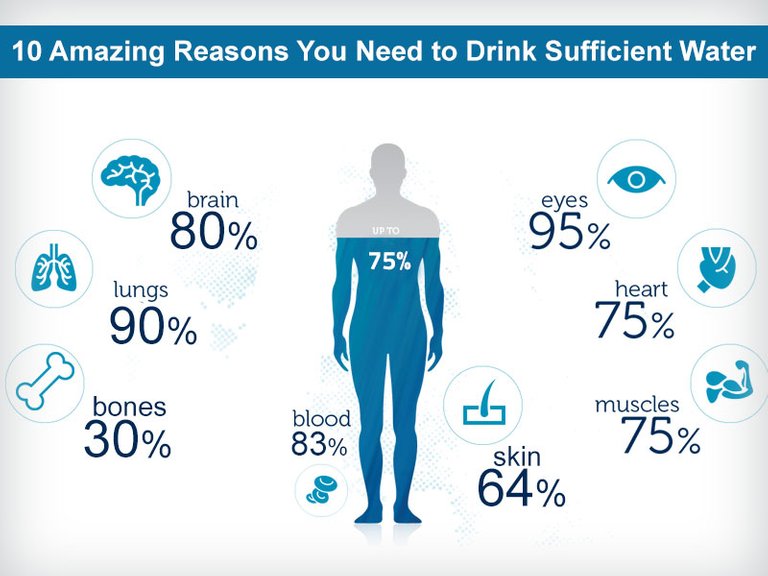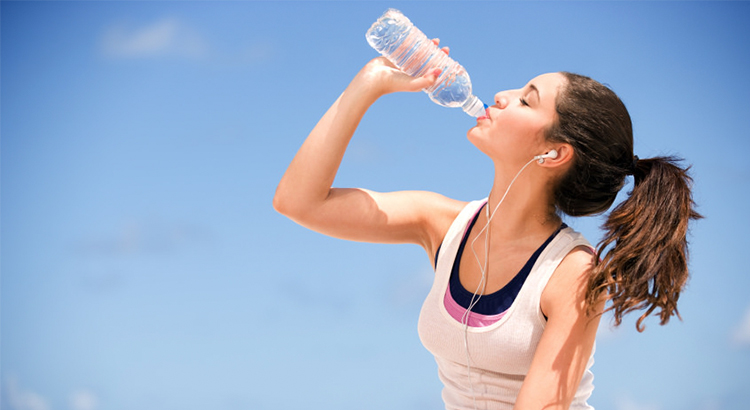
Picture created by femina
You know you need water to survive, and you feel better when you drink it regularly. But what’s really at play in the body when you sip water?
In a nutshell,
Believe it or not, your body weight is about 60% water, according to the U.S. Geological Survey. Your body uses water in all its cells metabolism, organs, and tissues to help regulate temperature and maintain other bodily functions. Because your body loses water through breathing, sweating, and digestion, it's important to rehydrate by drinking enough water and eating foods that contain water. Many people don't see the need of keeping their selves hydrated all time. Some many even stay up to hours without bothering of drinking water.
Here are some reasons our body needs water:
IT LUBRICATES THE JOINTS: Cartilage, found in joints and the disks of the spine, contains around 80 percent water. Long-term dehydration can reduce the joints’ shock-absorbing ability, leading to joint pain.
IT FORMS SALIVA AND MUCUS: Saliva helps us digest our food and keeps the mouth, nose, and eyes moist. This prevents friction and damage. Drinking water also keeps the mouth clean. Consumed instead of sweetened beverages, it can also reduce tooth decay.
IT DELIVERS OXYGEN THROUGHOUT THE BODY: Blood is more than 90 percent water, and blood carries oxygen to different parts of the body.
With dehydration, the skin can become more vulnerable to skin disorders and premature wrinkling.
IT CUSHIONS THE BRAIN, SPINAL CORD, AND OTHER SENSITIVE TISSUES: Dehydration can affect brain structure and function. It is also involved in the production of hormones and neurotransmitters. Prolonged dehydration can lead to problems with thinking and reasoning.
IT REGULATES BODY TEMPERATURE: Water that is stored in the middle layers of the skin comes to the skin’s surface as sweat when the body heats up. As it evaporates, it cools the body. In sport, when one is exhausted and the person is allowed to rest for some minutes,the sweat on the body surface will eventually evaporates leading to body cooling.
Having a lot of water in the body may reduce physical strain if heat stress occurs during exercise.
THE DIGESTIVE SYSTEM DEPENDS ON IT: The bowel needs water to work properly. Dehydration can lead to digestive problems, constipation, and an overly acidic stomach. This increases the risk of heartburn and stomach ulcers.water helps break down the food you eat, allowing its nutrients to be absorbed by your body. After you drink, both your small and large intestines absorb water, which moves into your bloodstream and is also used to break down nutrients. As your large intestine absorbs water, stool changes from liquid to solid. Water is also necessary to help you digest soluble fiber.
IT FLUSHES BODY WASTE: Water is needed in the processes of sweating and removal of urine and faeces.Adequate water intake enables your body to excrete waste through perspiration, urination, and defecation. Water helps your kidneys remove waste from your blood and keep the blood vessels that run to your kidneys open and filter them out. Water is also important for helping prevent
WATER KEEPS YOUR CARDIOVASCULAR SYSTEM HEALTHY: Water is a huge part of your blood. (For instance, plasma — the pale yellow liquid portion of your blood — is about 90 percent water) If you become dehydrated, your blood becomes more concentrated, which can lead to an imbalance of the electrolyte minerals it contains (sodium and potassium, for example). These electrolytes are necessary for proper muscle and heart function. “Dehydration can also lead to lower blood volume, and thus blood pressure, so you may feel light-headed or woozy standing up.
THE AIRWAYS NEED IT: When dehydrated, airways are restricted by the body in an effort to minimize water loss. This can make asthma and allergies worse.
IT PREVENTS KIDNEY DAMAGE: The kidneys regulate fluid in the body. Insufficient water can lead to kidney stones and other problems.
WEIGHT LOSS: Water may also help with weight loss, if it is consumed instead of sweetened juices and sodas. “Preloading” with water before meals can help prevent overeating by creating a sense of fullness.
IT REDUCES THE CHANCE OF A HANGOVER: When partying, unsweetened soda water with ice and lemon alternated with alcoholic drinks can help prevent overconsumption of alcohol.
SHOULD WE WORRY ABOUT DRINKING WATER MORE OFTEN
Probably not. Drinking too much water is rarely a problem for healthy, well-nourished adults. Athletes occasionally may drink too much water in an attempt to prevent dehydration during long or intense exercise. When you drink too much water, your kidneys can't get rid of the excess water. The sodium content of your blood becomes diluted. This condition, called hyponatremia, can be life-threatening.
REFERENCES:
https://www.medicalnewstoday.com/articles/290814
https://www.everydayhealth.com/water-health/water-body-health.aspx
https://integrisok.com/resources/on-your-health/2022/march/benefits-of-drinking-plenty-of-water




